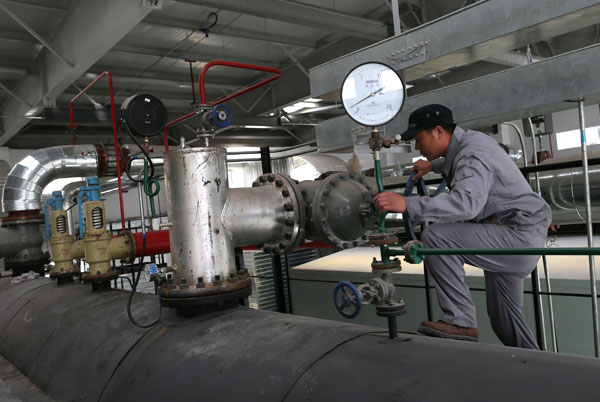Changing for clear skies
Updated: 2014-11-14 05:57
By Zheng Jinran(China Daily)
|
||||||||
 |
|
A worker examines equipment in a gasfired plant in Beijing. Traditional coalfired plants are switching to natural gas to generate power and supply heat for households from November in the capital. XUAN JUN / FOR CHINA DAILY |
Among the planned thermoelectric centers, Gaojing Thermal Power Plant, also called the northwestern thermoelectric center, was the largest one that came into service in 2014. It will provide heating for 400,000 households in the western areas of the capital in the coming winter.
"The new facilities can increase power generation capacity and serve larger areas. More importantly, they will emit nearly zero pollutants into the air,"said Gao Xinyu from the municipal reform and development bureau.
Adopting the use of natural gas with the upgraded facilities is good for long-term development, but the move has not come cheap.
The coal-fired facilities are still in good condition, but abandoning them will leave about 1 billion yuan ($163 million) of investment idle, plant Party chief He said.
An extra 5 billion yuan has been pumped into the plant's new facilities, and government subsidies will be needed to help plug the higher costs of using natural gas, he said.
All coal-firing units in the four thermoelectric centers will be shut by 2017.
More companies will also utilize similar facilities to consume natural gas. It has been estimated that demand for natural gas in Beijing will grow from the current 10 billion cubic meters to 18 billion cubic meters by 2017.
The municipal government will guarantee the supply of natural gas and provide more subsidies to promote environmentally friendly facilities in power generation and industrial production, said Gao from the municipal reform and development bureau.
Going green
Beijing's latest moves to reduce emissions have also motivated neighboring province Hebei and municipality Tianjin to upgrade and green their power generation facilities.
The four coal-fired power generation units of Chentang Power Plant in Tianjin will be closed by the end of 2015 and adopt eco-friendly units fueled by natural gas.
The power plant in Hebei's provincial capital, Shijiazhuang, has similarly invested about 500 million yuan since 2013 to introduce advanced technology in power generation and heating, which is expected to help cut emissions of sulfur dioxide by 2,300 tons and nitrogen oxides by 4,400 tons annually.
"There will be nearly no such emissions,"said Di Xiangdong, deputy head of production bureau of the Yuhua Generation Power Co Ltd.
The moves will increase daily operating costs by 65 yuan and reduce net profits from power generation by 100 million yuan a year, he said.
Improvements from the green measures are already noticeable in the power plants. During interviews at the Beijing and Shijiazhuang facilities, there was no marked difference indoors or outdoors with the absence of dust or noxious smells.
Hebei, a province that has witnessed severe air pollution in the past two years, has taken tough measures to curb emissions, including reining in coal consumption as well as shutting steel and iron companies and other polluting industries.
The province with heavy industries as its major economic engine saw economic growth slowing down in the first half of 2014, down to 5.2 percent, the second slowest in the country.
But provincial leaders have repeatedly highlighted their determination to curb air pollution, regardless of the economic impact.
"We will forbid any projects that emit air pollutants and promote tough measures to improve air quality, no matter what price we pay,"said Zhou Benshun, Hebei's Party chief.
Contact the writer atzhengjinran@chinadaily.com.cn

 Lang Lang honored with German award
Lang Lang honored with German award
 Premier Li attends the 9th East Asia Summit
Premier Li attends the 9th East Asia Summit
 Airshow China soars to success in Zhuhai
Airshow China soars to success in Zhuhai
 The most people dine on the beds
The most people dine on the beds
 Dangling workers rescued from World Trade Center
Dangling workers rescued from World Trade Center
 Long-term visas issued for China, US citizens
Long-term visas issued for China, US citizens
 Long-term visas issued for China, US citizens
Long-term visas issued for China, US citizens
 Culture Insider: Chic items in ancient China
Culture Insider: Chic items in ancient China
Most Viewed
Editor's Picks

|

|

|

|

|

|
Today's Top News
Beijing wants to keep 'APEC blue'
The Waldorf's hefty price tag
US, China reach landmark pacts
Youth urged to get politically involved
Rick Snyder seeks to woo China trade, giant pandas
China Oct data shows economy cooling further
Recalibrating China-US relations
US-China climate pact to pressure other countries
US Weekly

|

|








